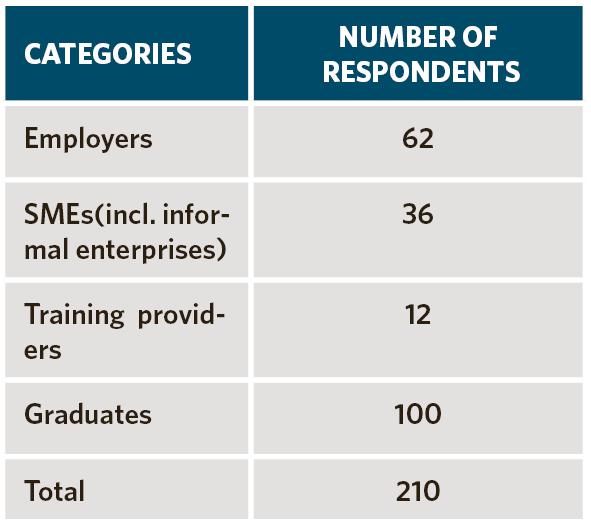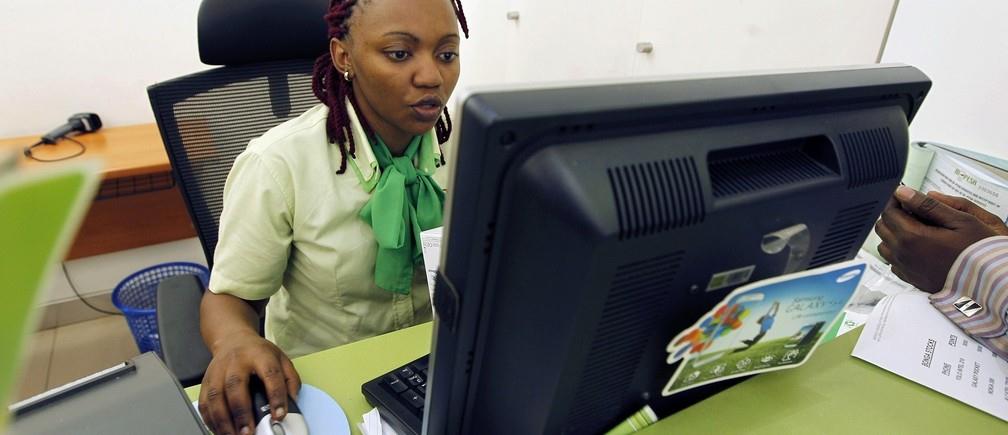The graduate-employer job market dissent
A new report commissioned by the Namibia Employers Federation last week found that locally-trained graduates are not well-equipped for the job market.
Ndama Nakashole
Results of a survey to asses challenges for employers in implementing apprenticeship programmes in Namibia reveal that a majority of employers do not believe Namibian graduates are well equipped for the job market, despite 91% of graduates interviewed saying they are well or very well equipped for the job market.
The survey, launched yesterday, was conducted by Business Intelligence Africa (BIA) for the Namibia Employers Federation (NEF), in partnership with the International Labour Organisation (ILO).
Of the 62 employers interviewed, 52% of them believe that Namibian graduates are poorly or very poorly trained for the job market.
Only 6% of the employers surveyed think that local graduates are well or very well equipped for the job market, while 42% believe they are averagely ready for the market.
The reasons given by employers for the negative ratings range from lack of practical experience, failure to link theory to practical and a skills mismatch, among many other unique reasons.
Unsurprisingly, of the 100 graduate surveyed, only one said graduates are not well equipped for the job market,
Seven graduates said they are averagely trained, while a whopping 91 believed local graduates are well trained for the local market.
One graduate did not provide a response.
Training providers however, indicated that their students are not sufficiently ready when entering the job market.
A low 8% of the 12 institutions interviewed said local graduates are very well trained for the job market.
Also, 25% of the training providers believe graduates are well trained, while 42% believe the graduates are averagely trained for the job market.
Eight percent of the training providers said the graduates are poorly trained, while the 17% either do not know or did not answer the question.
Training providers’ reasons for poor rating are that VTCs lack new equipment and that only few students get job attachment due to industry size, among other reasons.
The details
Eighty-one per cent of large enterprises stated that there are not enough skills as demanded by businesses.
The majority of these enterprises further said there are significant skills deficits.
This despite the fact that half of the 100 graduates interviewed were unemployed and only 38% of the working graduates are employed in the profession for which they trained and studied.
The survey also found that there is insufficient vocational training offered in Namibia in all professions, with 51% of the respondents saying so.
Another 17% said vocational training in Namibia is “not at all” sufficient.
Confirmation of a mismatch between tertiary and vocational training is further evidenced when 52% and 58% of the employers and training providers respectively, indicated that tertiary and vocational education in Namibia only meets some needs of the business community.
When asked what they think can help tackle the mismatch, employers said they want all VTCs to be run by the Namibia Institute of Mining and Technology (NIMT), among many other reasons.
The report further revealed that a majority of employers (large enterprises) and training providers want a dual system whereby trainees work and attend theoretical training in vocational professions.
Sixty five percent of large enterprises are currently in need of skilled personnel, the survey further found.
Apprenticeship
Given this mismatch, a system of offering an on-the-job training, accompanied by a formal study is the answer, according to NEF.
The majority of SMEs interviewed in the survey listed lack of funding as one of the major challenges in providing training while a majority of large enterprises listed lack of skilled trainers plus a lack of time as the main challenges.
Other challenges, among a long list, are lack of space, lack of interest from employees and trainees and lack of scope.
Despite the challenges, the majority of the employers and SMEs have provided internal training.
A majority (56%) of employers provided external training to employees, while only a few SMEs (11%) did this.
Both a majority of employers and SMEs said they are interested in offering trainees and /or graduates some kind of job attachment.
Of the 100 graduates, 75 of them said they have applied for apprenticeship before, and 40 out of those did so at a private company. For those who have not applied, they listed a lack of information and not being ready as some of the reasons they failed to do so.
The majority of those who did internships and job attachments said they never received any kind of support. An average number said they received financial support. Only few received allowances, tools and other kinds of support.
Based on survey results of overall challenges and opportunities in developing an apprentice programme, the report recommends that companies need to continue to work on a pilot plan by Namibia Training Authority (NTA) and NEF.
Companies are also urged to formalise apprentice programmes, as well as to become involved in significant ways.
There is also a need to find ways for SMEs and informal sector to be included in an apprentice programme.
Results of a survey to asses challenges for employers in implementing apprenticeship programmes in Namibia reveal that a majority of employers do not believe Namibian graduates are well equipped for the job market, despite 91% of graduates interviewed saying they are well or very well equipped for the job market.
The survey, launched yesterday, was conducted by Business Intelligence Africa (BIA) for the Namibia Employers Federation (NEF), in partnership with the International Labour Organisation (ILO).
Of the 62 employers interviewed, 52% of them believe that Namibian graduates are poorly or very poorly trained for the job market.
Only 6% of the employers surveyed think that local graduates are well or very well equipped for the job market, while 42% believe they are averagely ready for the market.
The reasons given by employers for the negative ratings range from lack of practical experience, failure to link theory to practical and a skills mismatch, among many other unique reasons.
Unsurprisingly, of the 100 graduate surveyed, only one said graduates are not well equipped for the job market,
Seven graduates said they are averagely trained, while a whopping 91 believed local graduates are well trained for the local market.
One graduate did not provide a response.
Training providers however, indicated that their students are not sufficiently ready when entering the job market.
A low 8% of the 12 institutions interviewed said local graduates are very well trained for the job market.
Also, 25% of the training providers believe graduates are well trained, while 42% believe the graduates are averagely trained for the job market.
Eight percent of the training providers said the graduates are poorly trained, while the 17% either do not know or did not answer the question.
Training providers’ reasons for poor rating are that VTCs lack new equipment and that only few students get job attachment due to industry size, among other reasons.
The details
Eighty-one per cent of large enterprises stated that there are not enough skills as demanded by businesses.
The majority of these enterprises further said there are significant skills deficits.
This despite the fact that half of the 100 graduates interviewed were unemployed and only 38% of the working graduates are employed in the profession for which they trained and studied.
The survey also found that there is insufficient vocational training offered in Namibia in all professions, with 51% of the respondents saying so.
Another 17% said vocational training in Namibia is “not at all” sufficient.
Confirmation of a mismatch between tertiary and vocational training is further evidenced when 52% and 58% of the employers and training providers respectively, indicated that tertiary and vocational education in Namibia only meets some needs of the business community.
When asked what they think can help tackle the mismatch, employers said they want all VTCs to be run by the Namibia Institute of Mining and Technology (NIMT), among many other reasons.
The report further revealed that a majority of employers (large enterprises) and training providers want a dual system whereby trainees work and attend theoretical training in vocational professions.
Sixty five percent of large enterprises are currently in need of skilled personnel, the survey further found.
Apprenticeship
Given this mismatch, a system of offering an on-the-job training, accompanied by a formal study is the answer, according to NEF.
The majority of SMEs interviewed in the survey listed lack of funding as one of the major challenges in providing training while a majority of large enterprises listed lack of skilled trainers plus a lack of time as the main challenges.
Other challenges, among a long list, are lack of space, lack of interest from employees and trainees and lack of scope.
Despite the challenges, the majority of the employers and SMEs have provided internal training.
A majority (56%) of employers provided external training to employees, while only a few SMEs (11%) did this.
Both a majority of employers and SMEs said they are interested in offering trainees and /or graduates some kind of job attachment.
Of the 100 graduates, 75 of them said they have applied for apprenticeship before, and 40 out of those did so at a private company. For those who have not applied, they listed a lack of information and not being ready as some of the reasons they failed to do so.
The majority of those who did internships and job attachments said they never received any kind of support. An average number said they received financial support. Only few received allowances, tools and other kinds of support.
Based on survey results of overall challenges and opportunities in developing an apprentice programme, the report recommends that companies need to continue to work on a pilot plan by Namibia Training Authority (NTA) and NEF.
Companies are also urged to formalise apprentice programmes, as well as to become involved in significant ways.
There is also a need to find ways for SMEs and informal sector to be included in an apprentice programme.






Comments
Namibian Sun
No comments have been left on this article